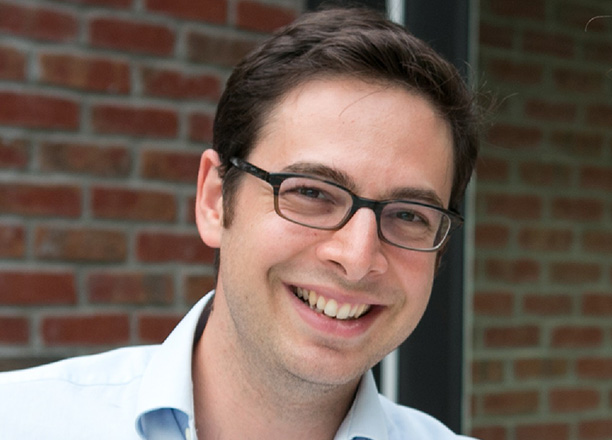Neir Eshel ’07 Studies the Brain’s Prediction-Making Processes
“That was when I knew that this was going to be a career for me,” Eshel says. “It was intellectually so gratifying.”
Eshel, now a psychiatry resident at Stanford University, is the grand prize winner of the 2016 Science & SciLifeLab Prize for Young Scientists, which comes with a $30,000 cash prize. Awarded by the journal Science and SciLifeLab, a scientific institution founded by four Swedish universities, the prize “recognizes promising early-career scientists who conduct groundbreaking life-science research.”
Eshel’s research is focused on the neuroscience behind learning and decision-making. For example, as a Marshall scholar in London, he studied how the brain makes multi-step decisions.
“If we were to think about all the possible moves in a multi-step decision, we would quickly exhaust our mental capacity,” he explains. “There has to be some heuristic to limit the number of options we consider in order to make a choice in a reasonable amount of time.”
Eshel pursued a joint M.D./Ph.D. degree at Harvard University, where he started conducting research on mice in order to determine a more basic, circuit-level mechanism for decision-making. He observed dopamine neurons in the mice’s brains as they learned easy tasks in order to understand how the dopamine circuit is involved in learning by trial and error.
“Dopamine neurons are known to encode something called prediction error, which is the difference between what you predict and what you actually get,” Eshel says. “That prediction error signal can be used for learning.”
Eshel explains that prediction is an inherent component of learning, since people make predictions and see the real outcome, and then update their future predictions based on the outcome. He specifically wanted to know how the dopamine neurons make these kinds of calculations and combine various inputs. This research formed the basis of his grand-prize winning essay, “Trial and Error,” which was featured in the Dec. 2, 2016, issue of Science.
In the essay, Eshel details the innovative techniques he used to study the neurons. He combined optogenetics, which uses light to control neurons, with well-known neuron recording techniques. He focused on the ventral tegmental area (VTA) of the brain, which is where dopamine is produced, and observed how the mice behaved when GABA neurons in the brain were stimulated or inhibited. GABA neurons measure how much reward to expect from an event.
Eshel discovered that individual dopamine neurons respond similarly, making them indistinguishable from one another. This means that prediction errors are transmitted throughout the brain, so other parts of the brain can interpret the errors. In addition, Eshel found that dopamine neurons compute prediction errors by subtracting expectation from reward, which is a very simple yet precise calculation.
The practical consequences of this are wide-ranging, but Eshel highlighted the impact of his work on treating addiction. Since most drugs of abuse hijack the very same system that he studied, he hoped his findings on dopamine prediction errors will lead the way to new treatments for addiction.
In order to receive his award, Eshel had to travel to Stockholm, Sweden, during the same week that the Nobel Prize ceremony occurred. Eshel and the award runners-up were treated to a large ceremony and got to travel around Sweden, visiting research labs and universities. They also met with high school students to talk to them about science. At the end of the trip, Eshel and his family attended the Nobel ceremony and dined at a banquet with the Nobel laureates.
“It was a truly astonishing and unforgettable experience,” he says. “We ate breakfast every morning with the Nobel laureates, and we got to go their award ceremonies and lavish banquets.”
After Eshel finishes his psychiatry residency, he plans to split his time between doing research and seeing patients in order to continue pursuing science and helping people work through problems. Assisting individual patients is “something that I can’t experience purely as a researcher,” he says. “On the other hand, I love the intellectual process of doing science and I can’t ever see myself not doing that.”












No responses yet